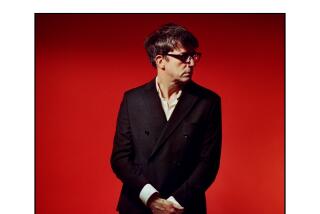Integrated Cockburn Sheds Tags : Pop music: His latest album, ‘Nothing but a Burning Light’--his 21st--unites his personal, political, spiritual sides.
- Share via
Bruce Cockburn has survived his share of tags during a 22-year recording career. He’s been perceived as a naturalistic folkie of rather romantic import from the Great White North (early ‘70s), then as a contemplative Christian mystic (circa the late ‘70s), and more recently as a fiery, Latin American-oriented leftist activist like Jackson Browne, only even angrier (mid-’80s).
Despite Cockburn’s distaste for these labels, there was always some truth in them at the time, given his shifting focuses. Not until his latest album, “Nothing but a Burning Light” (his 21st, and first for Columbia Records), has the lauded Canadian singer-songwriter really integrated these personal, political and spiritual sides evenly across a single recording.
When he plays the Celebrity Theatre in Anaheim on Wednesday--with shows to follow Friday at the Variety and Saturday at the Ventura Theatre--faithful fans will know to expect the full spectrum of Cockburn concerns: folk and blues-oriented rock songs extolling devotion to God; excoriating the treatment of American Indians or injustice below the border; concerning home, hearth, sex and civil war. Those who know him by just one of his tags may be surprised.
“(Labels) bother me to the extent that they might prevent somebody who might get something out of what I do from listening to it--who might be turned off by the prospect of listening to a Christian singer or a wild-eyed Commie from the north or whatever,” said Cockburn, 46, in a phone interview from a Eureka motel. “These images are bogus.
“You can see how laughable all that is with ‘If a Tree Falls,’ ” he said, referring to a 1989 song that was a hit in Canada. “All of a sudden I was being touted as an environmentalist in the press. I’m concerned about the environment like we all should be, but I don’t know much more about it than anyone else reading the paper. If you needed any evidence that you don’t need to take all those labels seriously, that was it, because it was all on the strength of that one song.”
Cockburn hasn’t always felt quite as impervious to perceptions.
“In the beginning it made me very nervous. I felt trapped way early on. When I was doing the first few albums, I got the image of this nature singer, and people assumed I was part of the back-to-the-land movement, which I wasn’t. I found that annoying, so I made a point of making an album with a lot of urban references in it and more humor, just because I wanted to shake that image.
“I guess you sort of do that by Method acting. My reaction even as a kid to being told you must be this or that was to go out and do something entirely opposite. And I still do that. If I’m being told that I’m supposed to be some kind of ‘born-again’ Christian in the media sense of the phrase born again, I’m not gonna act like that at all. Even if I wanted to I wouldn’t. But I wouldn’t want to anyway.”
The “Nothing but a Burning Light” album marks the first time Cockburn has recorded outside of Canada and without his usual retinue of musicians, having come to Los Angeles to work with producer T-Bone Burnett and such heavy-duty players as Booker T. Jones, Jim Keltner and even Jackson Browne. Loosening up, Cockburn--long regarded as a superlative acoustic guitarist--even got back to his twangy electric guitar roots as a kid who loved the Ventures and Duane Eddy.
“Most of the musicians I’d worked with over the course of the ‘80s came from a jazz background, or at least a very strong performance-oriented background,” said Cockburn. “What I was after this time was a rootsier, more basic approach to the songs.
“There’s a lot more fun in the shows right now. The people I’m traveling with pretty much come from a blues/roots background, and it’s compatible with the direction that’s obvious on the album. When we approach the older material, it also is being steered in that direction. It makes for an interesting variation on a theme.”
More to Read
The biggest entertainment stories
Get our big stories about Hollywood, film, television, music, arts, culture and more right in your inbox as soon as they publish.
You may occasionally receive promotional content from the Los Angeles Times.










